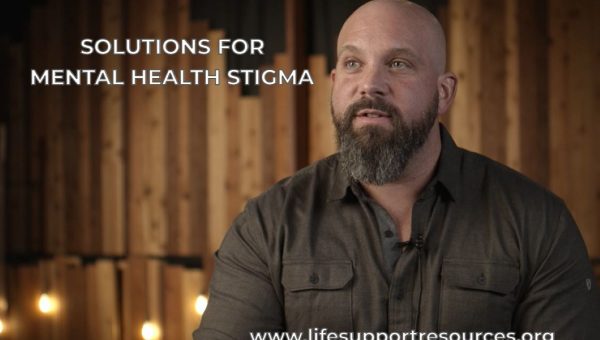Table of Contents
Finding Stories of Mental Health Stigma is Easy
Jason found mental health stigma at his church. The LifeSupport video Fear of Judgement introduces Jason who struggled with his mental health and addiction. Jason told us, “I was the guy that was putting on this fake front of a man… there was just so much pain inside and there are so many things that happened behind closed doors…you’re embarrassed to share what’s really happening in your life.” When he opened up to certain people in his church, he knew they were looking down on him.
The stigma of mental health is real, especially in churches.
“You are not praying hard enough,” “You don’t have enough faith, otherwise this wouldn’t be an issue,” “There is sin in your life that is causing this…”
These are just some of the stigma statements that mental health sufferers hear in churches that cause them to shy away from ever going back.
Even people with good intentions can cause massive harm to others. This is why stigma towards mental health is a serious problem. Two out of three Americans struggle with some kind of mental health issue.
So, why should we let stigma prevent churchgoers from coming forward with their struggles?
Shocking Statistics
- The number of suicides in the United States is rising dramatically from 36,900 in 2009 to more than 48,000 a decade later.
- Suicide is the tenth leading cause of death in the United States.
- Every 40 seconds, someone in the world is dying of suicide. Every 40 seconds. Let that sink in. Since you started reading this post, at least two people have died by suicide.
- Every year, over a million people, worldwide, die of suicide.
Simple Solutions To Mental Health Stigma
Fortunately, there are simple solutions for stigma of mental health in the church.
You don’t have to be a trained counselor or therapist to stop stigma in its tracks.
“Here is what we have to realize: You don’t have to do a lot to help a lot,” said Jarrid Wilson on The Carey Nieuwhof Leadership Podcast.
Wilson was a young church leader who struggled with mental health for many years. His death by suicide in 2019 shocked the world and brought much-needed attention to the topic of mental health in the church.
“The reality is, if the local church wants to be the hope of the world, then it needs to step into situations that people find themselves hopeless, and one of those things is mental health,” Wilson said. “That doesn’t mean you have to suddenly create 40 books, or a curriculum…you can literally stand on a stage and say, ‘Hey, I know a lot of you are dealing with depression and suicidal thoughts right now, I just want you to know, as leaders of this church, we love you, we care about you, we know that is the battle you are dealing with and we will be here to support you. If you are struggling, don’t be ashamed. Come talk to us.’ That right there, just talking about it, is what will end the stigma and could literally save lives because then someone might be like, ‘Wow, I am not ashamed because I can talk to someone about this because my church has my back.’”
Simply talking about mental health and welcoming those to just come share about it is the first, and biggest, step to ending stigma in your church.
Small Steps That Have Big Impact
Does talking about mental health address what happens next?
No, that will take more work, but the next steps to addressing mental health cannot take place if there is still stigma lurking in the church.
Carey Nieuwhof has dealt with this in his church and found easy ways to always keep the door open for those with mental health.
“Now we have a list of five Christian counselors that are trained and accredited that we trust, that we believe will bring Jesus into the equation,” Nieuwhof said. “We also have some phone numbers of community services that we hand out, again and again, from marriage counseling, right to people who are really struggling.”
The bottom line is, you do not have to become a professional therapist to make a big difference when it comes to mental health. Just being present and listening to those struggling can make the biggest difference in the world.


Pingback: Leadership Transparency - LifeSupport Resources